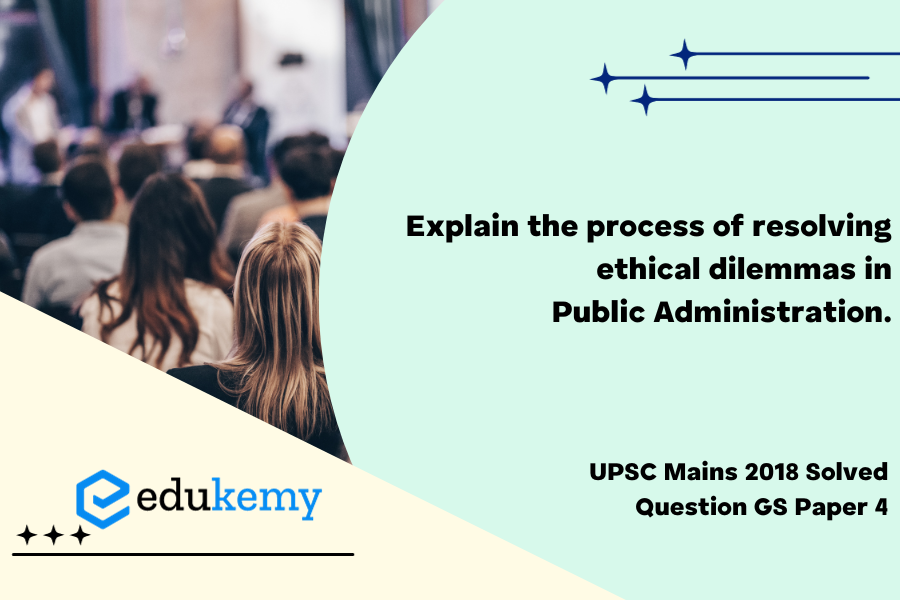Resolving ethical dilemmas in Public Administration is a nuanced and critical process that demands careful consideration of competing values, principles, and interests. As stewards of public trust, administrators are tasked with navigating complex situations where ethical obligations may conflict. The process typically begins with a thorough analysis of the dilemma, identifying the stakeholders involved and the potential consequences of various courses of action. A comprehensive understanding of relevant laws, regulations, and ethical codes forms the foundation for decision-making. Public administrators must weigh the competing values of transparency, accountability, and efficiency against each other, seeking a balanced resolution that upholds the public interest. Consultation with ethics committees, legal experts, and other professionals is often integral to the decision-making process. Furthermore, fostering a culture of ethical awareness and continuous training within the public administration can contribute to a proactive approach in preventing ethical dilemmas. Ultimately, the resolution of ethical dilemmas in Public Administration requires a commitment to upholding the highest standards of integrity while navigating the intricate web of responsibilities inherent in serving the public.
Tag: Ethical concerns and dilemmas in government and private institutions.
Contents
Decoding the Question:
- In the Introduction, try to define ethical dilemmas.
- In Body, discuss the process of resolving ethical dilemmas.
- In Conclusion, try to write your opinion.
Answer:
An ethical dilemma originates from a situation that necessitates a choice between competing options of principles in a given, generally undesirable or perplexing, situation. The conflicts of interest are possibly the most obvious example that could place public sector leaders in an ethical dilemma. An ethical dilemma is one of the most challenging aspects that a civil servant faces in his professional life. Some of the most common ethical dilemmas with which public servants are confronted revolve around aspects such as administrative discretion, corruption, nepotism, administrative secrecy, information leaks, public accountability and policy dilemmas.

Dilemmas for Public Servants:
- Dilemmas between professional ethics and own personal values.
- Dilemma due to duty towards the community and being responsive to the government.
- In his desire to hold onto a job versus professional ethics.
- Ethical dilemmas can arise, when two equally striking options are justified as right in certain situations.
- For a public servant attempting to function as a professional, the demands of law, his duty, fairness, due process, provides a productive ground in which ethical dilemmas arises.
- Other types of ethical dilemmas in which public servants may find themselves include conflict between:
- The values of public administration.
- Unclear or opposing answer-abilities.
- Personal morals and work ethics versus administrative directive.
- Validations for the institutions.
- professional ethics and director or executive directive.
- Features of the code of conduct.
Ways to resolve ethical dilemma:
Following Rules:
- One of the best ways to tackle ethical dilemmas is to follow the prescribed rules under that prevailing situation. These rules and regulations will provide a possible exit from the tough conditions during that time. They also act as a shielding mechanism when any questions are asked about the steps taken.
- Example: As a police officer when you encounter a situation where student protestors are to be stopped from demonstrating on an important issue, protocol is followed rather than thinking about wrong and right.
Public Welfare:
- Sometimes in conditions where our steps could lead to some other consequence, we try to keep public welfare above all. The welfare prospect will trump all other explanations and will provide the guiding light.
- Example: Large groups of people want to take part in a peaceful march in a communally sensitive area. The office rejects permission citing public order, even though it violates their freedom for peaceful assembly.
Suggestion and Contemplation:
- In some cases experiences of higher officials or guides will help in getting out of dilemmas. These suggestions not only provide help but also prevent oneself from taking any wrong decisions especially during the start of one’s career in public service.
Anthony Makrydemetres sets out the ALIR model of imperatives of ethical reasoning – a set of basic principles that integrate and rearrange the process of dealing with ethical dilemmas. The four functionally related imperatives are:
- the principle of democratic legitimacy and accountability of public bureaucracy and administration;
- the rule of law and the principle of legality whereby law and only law should govern the administration;
- the principle of meritocracy, professional integrity, autonomy and capacity of the administrative apparatus of the state; and
- the principle of responsiveness and responsibility of administration to civil society.
When confronted with the fundamental question of what to do and how to act in complex situations, and to the extent that contrasted values or decisional premises could apply in the situation, one is entering the world of ethical dilemmas or that of ‘hard choices’. Therefore, the public servants have to be well equipped with proper technique and measures to tackle ethical dilemmas in their life. Ethical dilemmas are very sensitive issues which make up the core challenges in public service. Tackling them requires proper training. All ethical and moral issues along with the public policies, laws, rules and regulations are to be kept in mind while resolving a dilemma.
In case you still have your doubts, contact us on 9811333901.
For UPSC Prelims Resources, Click here
For Daily Updates and Study Material:
Join our Telegram Channel – Edukemy for IAS
- 1. Learn through Videos – here
- 2. Be Exam Ready by Practicing Daily MCQs – here
- 3. Daily Newsletter – Get all your Current Affairs Covered – here
- 4. Mains Answer Writing Practice – here


